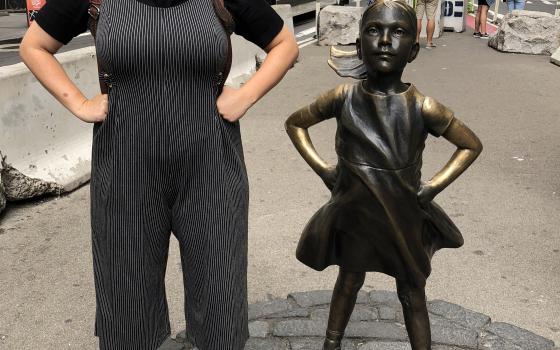Notes from the Field includes reports from young people volunteering in ministries of Catholic sisters. A partnership with Catholic Volunteer Network, the project began in the summer of 2015. This is our eighth round of bloggers: Sarabella Muise is a Good Shepherd Volunteer in New York City. This is Sarabella's second blog post. Read more about her.
___
At 17th Street — the therapeutic group home where I am serving — the average age of the residents is 18. When I was 18, I had just graduated from high school. I attended a private, Catholic, all-girls school whose motto is "Not words but deeds." I was taught this phrase as I first walked through the doors and it hung behind the stage I walked across to receive my high school diploma.
Through four years of learning, observing and practicing "not words, but deeds," I was able to internalize this mantra into something I truly value and believe in as a young adult, and it has been on my mind a lot lately.
At work, I spend a lot of time in the staff office, behind a computer, doing paperwork. For the most part I actually enjoy completing these tasks. But lately, I have found myself getting too entranced by them. I signed up to do a service year primarily for the opportunity to interact with clients, not for paperwork. But I seem to have fallen into a pattern of prioritizing the latter. This realization has made me feel I am not doing enough "deeds."
I want to interact with my residents more. When I think about how I want those interactions to go, there are a handful of clear values I intend to bring to the table. For example, I believe in recognizing the validity and importance of every individual's experience. I believe everyone's emotions deserve to be felt, heard and honored, and I believe unconditional support can change someone's life.
I have come to hold these values by witnessing people in my own life treat me in these ways. For example, whenever I speak to my aunt she has a steadfast way of listening that always validates my experience. I had high school teachers simply sit with me as I wrestled with the fear of leaving for college, allowing me to honor my feelings while they did the same. And, of course, there is my mother, who is a constant example of unconditional love.
As I begin to dive into my spiritual life through being a Good Shepherd Volunteer, I have realized that in all of these interactions I have felt a deep sense of sacredness. When I have been allowed to be my true self — be it raw, irritated, happy or goofy, and another person has given me the space to be those things — it is so sacred.
However, a commonality between these interactions and how I have experienced them in my life so far is that they are all about me. It is the other person making me feel seen and heard and loved and respected that has lead to this sacredness I feel. But in my work at 17th Street, it is essentially my job to provide that for someone else. And so far, that feels very different.
I know the ways I have been treated are without a doubt the way I want to treat others, including friends, colleagues and my residents. And the good news is, all of the people in my life who have treated me with such compassion have made it look easy! In interactions with me throughout my transition from teen years into adulthood, supportive people including my family, bosses, teachers and counselors have moved right alongside me with grace and what I perceive as ease. It's easy to think about treating others this way and seeing people treat me in this way has made it look easy, so I thought it was easy.
It is not easy.
Right now in my work, I feel the opposite of "not words, but deeds." I feel like "lots of words," or, in this case, thoughts, and "almost no deeds," or actions. It is hard wanting to provide unconditional support to a youth who talks about her deep desire to get her GED yet repeatedly refuses to attend her GED classes. It is hard to allow for a teenager "to feel her feelings" when that manifests itself in extreme acting out — like trashing the entire kitchen. It is hard to believe that a non-compliant, self-medicating youth with no current desire to change can change.
It is hard.
So, I have been getting discouraged. I don't feel that I am acting nearly enough to demonstrate —to really live — the values I believe in so deeply. In fact, I notice myself often being scared to even try, resorting to the corner computer and filling out more paperwork.
...
That was originally going to be the end of this blog post; my expressing the honest frustration I feel in taking action that can so quickly feel fruitless. But then I came to work today.
On my way to my 7 a.m. shift I was kicking myself for my general lack of action, as I have been doing for the last few weeks. When I arrived, it was immediately relayed to me that one of our residents had been hospitalized the night before for suicidal ideation, and someone had to go accompany her at the hospital. They asked me.
Without a second thought, without any doubt, I acted. I said yes. I put on my coat, I got on the bus, I arrived at the hospital and for the next nine hours, I sat in front of the emergency psychiatric intake room.
Although she was asleep for six of those nine hours, I could barely leave to go use the bathroom because I didn't want her to wake up and think she was alone. At one point during visiting time, I went into her room just to try and tell her I was there, even though she was still sleeping.
She opened her eyes groggily, then turned over and fell back asleep, but I think she saw me. Throughout the day I knocked on the doctor's door upwards of 15 times to try and get any information that I could — to no avail. I sat there so long that I began answering other visitors' questions about where they could keep their things, who they could speak to and what doors they could and could not knock on.
When my resident finally woke up, I sat next to her bed. We ate fruit together and she said she was scared as tears rolled down her cheeks. I told her I didn't have any answers for her — because I didn't — but that we would move through the process together. We made small talk about her interest in forensic anthropology, breakfast food, her forgotten hobby of drawing and the newest Ariana Grande song.
Objectively, I really didn't do much at all. I sat. I said "I know," and I bought fruit. But how much or how little I did does not really matter.
I acted.
[Sarabella Muise is a Good Shepherd Volunteer at a therapeutic residence for adolescent girls in New York City.]

